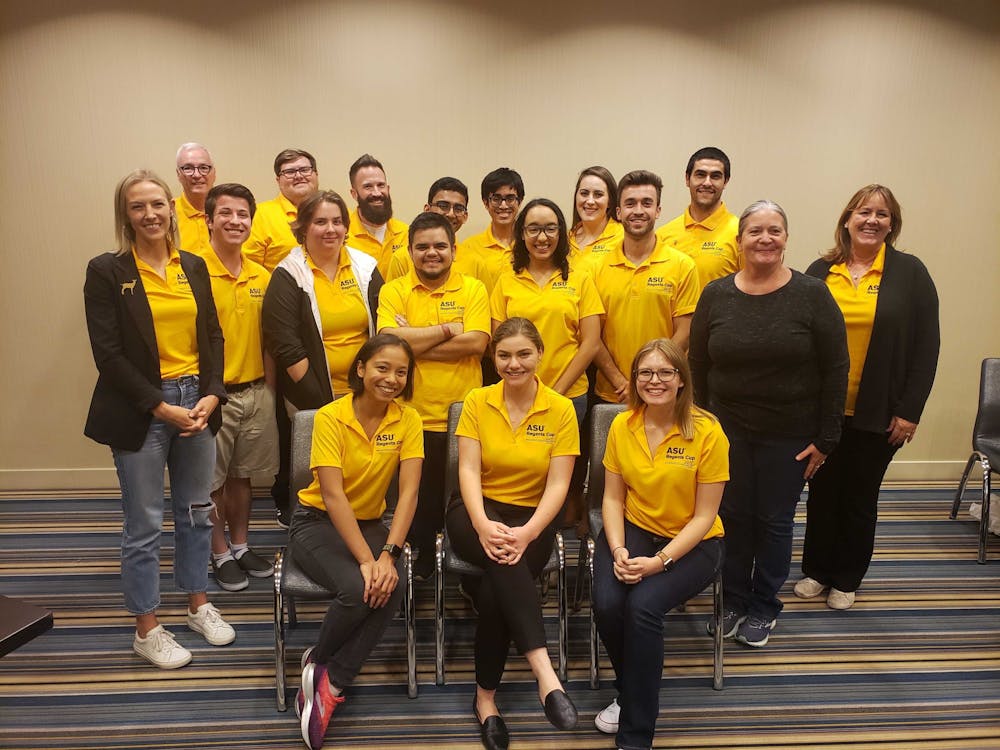In the Arizona Board of Regents' inaugural Regents’ Cup on Saturday, Nov. 16, ASU students took first and third place. The students debated topics surrounding free speech, such as if and how it should be regulated.
The Cup, held at UA, hosted 36 student competitors from ASU, NAU and UA. Six two-person teams from each university competed to win scholarship money — $16,600 for first place, $12,450 for second place, $6,225 for third place and $500 for each non-placing participant. The debates took form in the styles of civil dialogue, solutions debate, persuasive storytelling and Oxford debate, which is different than typical speech and debate format.
Junior physics major Valielza O'Keefe and sophomore systems engineering major Joshua Pardhe took first place after the final round of the debates, the Oxford-style debate.
Pardhe said the biggest thing he took from competing in the cup was the connections he made along the way.
"I mean yes, we learned how to debate and we learned how to story tell, but we all just made 12 or 13 good friends,” he said.
O’Keefe said that though the competition was designed to be a series of debates, there was a heavy emphasis placed on allowing every voice to be heard and acknowledged.
“I think something that was really beautiful about this competition is that because there were so many rules for civility and decorum, I think it really leveled out a lot of that disadvantage,” she said.
All three Arizona universities hold the green light rating, the highest rating granted by the Foundation for Individual Rights in Education, which ranks free speech on college campuses.
According to FIRE’s website, a green light rating means that FIRE is not "currently aware of any serious threats to students’ free speech rights in the policies on that campus.”
According to ASU's Communication Lab director Bonnie Wentzel, who was a key player in the design of the cup and the ASU teams’ preparations for the competition, the green light rating is a fitting reflection of Arizonans’ values.
“We generally say what we think, but we care about the other person at the same time, we aspire to that anyways," Wentzel said. "And so the fact that we had that kind of green rating and we celebrate that in a more public way."
Wentzel said a key focus of the competition was creating an environment where a variety of voices could be heard advocating a wide range of viewpoints. ASU’s teams alone had students from several different majors and ethnic backgrounds, such as a U.S. Navy veteran, a comedian and participants ranged from 17 to 34 years old.
Third place ASU winnersJessica Carter and Logan Guthrie are both members of the ASU forensics team. Like O’Keefe, Carter and Guthrie said they needed to "un-train" the habits they held from their previous experiences in speech and debate because the competition prioritized cooperation over competitiveness.
“At the same time, in terms of things (like) ability, research skills (and) argumentation ... I definitely think debate, both in high school and in college, has helped to shape the way that we approached it,” said Guthrie, a junior studying philosophy.
Assisting in preparing the students for the competition was Forensics Team director Adam Symonds, who said administrative preparations for the Regents’ Cup began about a year in advance.
“The focus of this event was to figure out how to communicate with people on the other side in a way that was meaningful and productive, that you could sort of inch towards agreement,” he said. “That process of thinking through your side, thinking through their side and trying to come up with something that is amenable to both, I think that is really undervalued.”
At the university level, Wentzel said she hopes that all students can learn to see the value of cooperative collaboration the same way it took place at the Regents’ Cup.
She said that though working together isn’t fast in a world where everything moves quickly, it is worth the effort.
“In the long run, coming together is where you get the better ideas," Wentzel said. "It's where you have a celebration of humanity, and it's just where better solutions come from. We are a society of competing monologues, but if we were more of a society of converging civil dialogues, we would just get so much further.”
Reach the reporter at gforslund@comcast.net and on Twitter @GretaForslund.
Like The State Press on Facebook and follow @statepress on Twitter.




